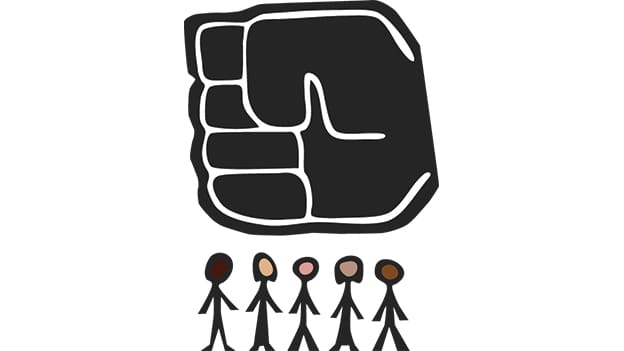Women overcoming gender stereotypes

Experts suggested that it is time companies considered female talent as a valuable asset and refocused their efforts to not only realize the training investments made on them but also double the efforts to retain them
Women are less likely to be perceived as justified while displaying power and authority when compared to men and that hampers their movement
Soon after International Women’s Day, the World Wide Web was inundated with news about corporates exhibiting more concern for their female staff. While some reports talked about special trainings for women executives, others focused on the hiring of the fairer sex in order to keep up their diversity numbers and improve the perceived value of their women employees through an image makeover.
A lot has been spoken about women empowerment in the corporate world and a lot has been done as well. However, how much of it has brought about a real change still remains unanswered. Women across the globe at various hierarchal levels face numerous hardships and obstacles such as a lack of gender sensitivity, dearth of appropriate opportunities or flexible work options on their path to professional success.
Forbes reported that only 4.6 per cent of CEO positions in Fortune 500 companies are held by women and an equal percentage in the Fortune 1000 companies. A Grant Thornton research report revealed that the representation of Indian women in senior company positions is still a cause for concern. The Indian average is at 14 per cent, much below the global average at 24 per cent. Not only that, it has been reported that more than 60 per cent of women quit their careers at the mid-managerial levels.
GlobalHunt MD Sunil Goel said, “More than 60 per cent of women quit their careers, especially at the middle level, due to personal and family liabilities. Either that or they have not been given adequate support and space within the organization to grow further.”
Experts suggested that it is time companies considered female talent as a valuable asset and refocused their efforts to not only realize the training investments made on them but also double the efforts to retain them. In an interview, PwC India Consulting leader Satyavati Berera said, “Organizations need to have more pro-gender diversity policies and ensure equal participation of women and men in decision-making process at all levels.”
Getting inclusive
However, a lot of companies in India are becoming more inclusive and are nurturing their women leaders to take up higher roles. Companies like Maruti Suzuki, Wipro, PwC and PepsiCo have already introduced innovative measures and trainings to empower their women executives to go beyond their comfort level and attain an edge over their male counterparts.
Emphasizing the importance of such trainings, SY Siddiqui, COO, Administration, Maruti Suzuki said in a press statement, “The idea of these specialized programmes for women is to prepare them for leadership roles in the company and thereby expanding the leadership pipeline for future. We are confident these programmes will help our female talent to groom themselves for bigger roles.”
Women are being trained on networking skills, people and emotional management skills, leadership skills etc. in order to prepare them to be able to confidently embrace bigger roles and prove their capability. Sheenam Ohrie, Head of Diversity & Inclusion, SAP India, said in an interview, “For emerging leaders, concerns are more complex and generally softer in nature. They get solved through higher tools like coaching/observing through shadowing.” PepsiCo recently launched an initiative called ‘Fortifying your Fortitude’ through its Diversity and Inclusion Council. Under the initiative, they organize workshops to equip women to deal with various life stages and negotiating and networking sessions.
In a proactive measure, Tata Power conducted a detailed survey and provided the most pertinent trainings to its female staff. “The programme covered various aspects including enabling women leaders to interact with organizational leadership, gender sensitization, experience sharing with successful women leaders and topics on work-life balance, people management and emotional intelligence,” said Chetan Tolia, Chief Human Resources Officer at Tata Power, told the press. Most organizations are coming to realize that the right kind of trainings provided to middle management level women employees with an average work experience of 8-10 years will benefit the company also in the long run. Sunita Cherian, VP-HR and Head-Diversity at Wipro, said, “At this stage, structured guidance helps women leaders find balance and set new levels of success.”
Stereotyping, is it the culprit?
On a global level, the sentiment has spread in a more stimulating fashion. LeanIn.Org, a non-profit committed to encouraging all women to achieve their ambitions – co-founded by Sheryl Sandberg, COO of Facebook and Rachel Thomas – launched a campaign called ‘Ban Bossy’. This campaign evoked the interest of experts, senior leaders and veterans from the industry and witnessed over millions of supporters. It was followed up by streams of opinions and initiatives in sync with its mission and ideology. The campaign aims to ensure that girls grow up with the confidence and support they need to become leaders. The essence of the campaign comes from the fact that girls with extraordinary confidence, who grow up to be leaders in their respective fields, are often labelled as being bossy.
LeanIn.Org Co-founder and President Rachel Thomas stated, “This is not just about a single word. The stereotypes behind the word “bossy” are deep rooted and discouraging. We expect boys to be assertive and confident, while we expect girls to be kind and nurturing. We encourage boys to lead and reward them when they do. When girls lead, however, we disapprove and our language communicates that disapproval clearly.”
Most women who try to climb the ladder are held back by such gender stereotypes. Women are less likely to be perceived as justified while displaying power and authority when compared to men and that hampers their movement. On the other hand, there are numerous women who are successful leaders and yet are typecast as being ‘bossy’ like Indra Nooyi, Condoleezza Rice, Michelle Obama. They were all determined to fight any kind of stereotype that came their way, but what of others who might face a downfall victimized by this unfair perception?
The interesting question faced is why from the very beginning boys are expected to be assertive, confident and opinionated, while girls are told be kind, nurturing and compassionate? Leadership experts have always emphasized that most good leaders are not those who are authoritative in their style, but those who can balance power and compassion and are affiliative. This, in a way, affirms that successful women leaders may be termed ‘bossy’, but they have been able to strike a balance between authority and kindness. They clearly saw the thin line between being ‘bossy’ and being ‘considerate and kind’ and knew when to be on which side.
None of it can be tagged as right or wrong, as Jennifer Merritt, Editor BBC Capital at BBC Worldwide said, “Being bossy isn’t a good thing. Being labelled bossy just because you're a girl isn’t a good thing either”.
For people stuck in the stereotype maze, CBS anchor Norah O’Donnell had this to say – “Next time you hear a girl called bossy, take a deep breath and say, ‘That girl’s not bossy. She has executive leadership skills”.
There is a tide of gender sensitization in India and across the globe and companies are doing their bit to increase diversity. It’s not about making it a women’s world, but about a women-friendly world, and the initiatives seem to bring a light of hope as more women employees are expected to take up senior roles in the future.
Sources: Economic Times, Forbes, LinkedIn, The Wall Street Journal











